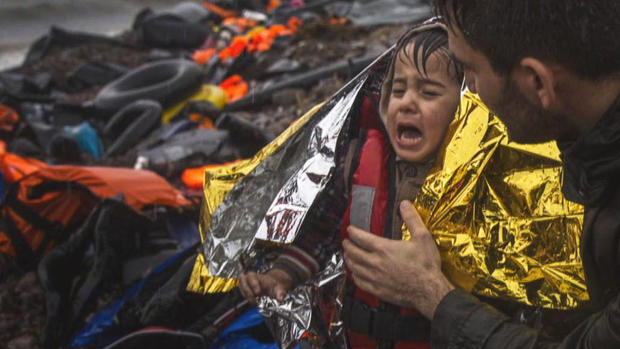Syria's Assad blasts U.S.' "willful blindness" in fight against ISIS
BEIRUT -- Syrian President Bashar Assad said in an interview aired Wednesday that his priority is "defeating terrorism" in Syria and urged all political and armed factions in the country to unite in the fight against terrorist groups.
In an interview with Russian media, Assad also said there can be no political solution for his country's crisis until terrorism is defeated. He singled out the Islamic State of Iraq and Syria (ISIS), which has captured about a third of Syrian territory along with large swaths of land in neighboring Iraq, as well as al Qaeda's branch in Syria, the Nusra Front, and "some others," without specifying.
The government in Damascus has long labelled all armed groups fighting Assad's forces as "terrorists." Assad made no reference to the extreme violence his forces have used on civilian areas during the country's civil war, now in its fifth year, repeating only that some mistakes have been made.
Moscow has been a staunch supporter of Assad throughout the crisis. Russian President Vladimir Putin has said it is impossible to defeat ISIS without cooperating with Damascus. He has urged other nations to follow Russia's example and offer military support to Assad's government.
In recent days, Moscow has sent about a half-dozen battle tanks and other weaponry - along with military advisers, technicians, security guards and portable housing units - to Syria with the apparent goal of setting up an air base near the coastal town of Latakia, an Assad stronghold.
U.S. officials have said Moscow is simply trying to prop up Assad and have rejected his participation in the global war on ISIS, also known by its acronym ISIL.
"Nothing's changed about the fact that we don't want to see the Assad regime getting any support," State Department spokesman John Kirby said. "There can't be a role (for) the Assad regime in efforts to stabilize the situation in Syria, much less go against ISIL."
In the interview, Assad did not directly address the Russian moves, only praising Moscow as an "independent state" and an "impartial" broker of dialogue between Syrian groups.
He urged the formation of a united front against ISIS, saying the priority of every single Syrian citizen is to be secure.
"We, the political parties, the government and the armed groups that fought against the government, we must all unite in the name of defeating terrorism," Assad said. He added he would only give up power if the people ask him to do so, not the United States.
Assad said the U.S., which has been leading a coalition that is carrying out airstrikes on ISIS militants in Syria and Iraq, refuses to work and coordinate with his government.
For the U.S. officials, "if they cooperate with the Syrian army, this is like recognition of our effectiveness in fighting ISIS," Assad added. "This is part of the willful blindness of the American administration, unfortunately."
In an interview with CBS News, Russia's U.N. Ambassador Vitaly Churkin said he believes that America's opinion on Assad in the conflict has evolved behind the scenes.
"I think this is one thing we share now with the United States, with the U.S. government: They don't want the Assad government to fall. They don't want it to fall. They want to fight (ISIS) in a way which is not going to harm the Syrian government," Churkin said. "On the other hand, they don't want the Syrian government to take advantage of their campaign against (ISIS.) But they don't want to harm the Syrian government by their action. This is very complex."
Assad also took the opportunity to deny claims that there is an Iranian initiative on the table, saying there were only "ideas and principles" that are based on the issue of Syrian sovereignty and combatting terrorism. The Shiite powerhouse is also a key ally of Assad, who hails from the minority Alawites, a Shiite offshoot.
The Syrian leader suggested he was prepared to share power with some members of the opposition, but added that no political solution can be implemented unless terrorism is defeated first.
Assad also blamed Europe for the refugee crisis currently hitting the continent, saying it is a direct result of the West's support of extremists in Syria over the past four years.
He cited what he described as a failure to enforce a controlled immigration system, forcing refugees to set out across perilous seas.
"We all mourn these innocent victims, but is one life lost drowned at sea more valuable than those who have died in Syria," he asked.
"How can one be indignant about a drowned child and remain silent about the death of thousands of children, elderly people, women and men killed by terrorists in Syria? These European double standards are unacceptable," he added.
He also accused Europe of supporting "terrorism" and providing "protection for terrorists, calling them moderates, divides them into groups, when they are in fact the terrorist groups in Syria."
"If you are worried about them (refugees), stop supporting terrorists," he said, addressing Europe.
